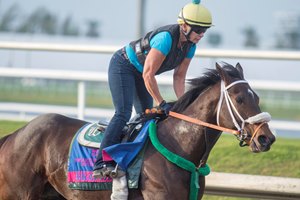Calumet Farm Sends Bravazo, True Timber to Pegasus


Trainer D. Wayne Lukas is in his second iteration of adding to iconic Calumet Farm's legacy. He's hoping the next chapter comes with the homebred 4-year-old colt Bravazo in the $9 million Pegasus World Cup Invitational Stakes (G1) Jan. 26 at Gulfstream Park.
Calumet Farm actually has two shots in the Pegasus, with Cigar Mile Handicap Presented by NYRA Bets (G1) runner-up True Timber from the barn of Lukas' former assistant Kiaran McLaughlin.
"He is, No. 1, committed to trying to develop world-class horses," Lukas said of Brad Kelley, Calumet Farm's owner since 2012. "He has stepped up in every way to get the numbers. I think the philosophy has been if we cover all the bases, we'll get some world-class horses like Oxbow and Bravazo. They've been aggressive in sending out horses. Not many farms would send out the number of horses they have in training. Some of the Kentucky farms that are very successful only send out eight or 10 horses a year."

Calumet Farm finished third among all North American owners in purse earnings in 2018 with $6.3 million. Its 86 wins ranked seventh nationally, and the farm was a racing secretary's dream with 599 starters, fourth-most in North America.
Kelley's first start under the Calumet Farm banner was a ninth-place finish in an Oaklawn Park maiden race with Wine Glow Feb. 7, 2013. In Kelley's 10th start as Calumet, Optimizer won the Fair Grounds Handicap (G3T)—the first graded stakes victory under the Calumet name in a decade. Three months later, Skyring won Pimlico Race Course's Dixie Stakes (G2T) at 24-1 odds, followed an hour later by 15-1 Oxbow capturing the Preakness Stakes (G1).
It was Calumet Farm's record 18th Triple Crown race victory and the first since Forward Pass won the 1968 Preakness. Oxbow's Preakness also provided the first grade 1 win in the Calumet Farm name since the Lukas-trained Horse of the Year Criminal Type won Saratoga's 1990 Whitney Handicap (G1).
Criminal Type proved the last hurrah for Calumet Farm founder William Monroe Wright's sequence of heirs and in-laws who subsequently controlled the now 95-year-old Central Kentucky farm until it was sold at bankruptcy auction in 1992. Prominent horse owner Henryk de Kwiatkowski paid $17 million for the property and $210,000 for the Calumet Farm name.
Calumet operated as a boarding farm and was passed on to de Kwiatkowski's children through a trust upon his death in 2003. The farm resumed as a stallion operation, bred and sold a grade 1 winner, and had modest success racing, but nothing approaching what Kelley has done in five years.
Today's Calumet has 17 stallions at its farm and six others in regional markets. A total of 308 Calumet-bred horses (not counting partnerships) raced in 2018—the most among North American breeders—earning a combined $8.57 million that was topped only by WinStar Farm-bred horses.
"He not only has revived Calumet from a physical standpoint—I'm talking about the plant, the fences, the buildings, the barns, which in itself is a great tribute to him to preserve that Kentucky tradition—but to step up and buy mares and studs and try to jump-start the program," Lukas said of the 62-year-old Kelley, an intensely private self-made billionaire. "It would probably take other people 25 years to get where he's gotten, with probably more than 200 mares. I think his commitment is stronger than anybody I've seen … in the business. Period."
Training True Timber for Calumet also has special meaning for McLaughlin, the Lexington product who recalls field trips to the historic farm famous for its meticulous white fences and white barns with red trim, and its record eight Kentucky Derby (G1) winners, including Triple Crown legends Whirlaway (1941) and Citation (1948).
"It's an honor to train for Calumet," McLaughlin said. "They are a landmark in Lexington. … The jackets were a hot item as a kid, the red and blue jackets that said Calumet on them. Growing up in Lexington, the high schools used to go there and take yearbook pictures. Calumet was Calumet, and it's great that Mr. Kelley has tried to bring it back to the top level of the Thoroughbred industry."
Kelley grew up in Franklin, Ky., and today lives in the Nashville suburb of Franklin, Tenn. The non-smoker made his fortune founding Commonwealth Brands discount cigarettes in 1991, selling the company a decade later for $1 billion to Houchens Industries. He ranks among the largest private landowners in America with more than a million acres, including an affinity for ranches.
Calumet Farm is in keeping with Kelley's environmental and wildlife conservation efforts. He technically leases the property from his Calumet Investment Trust, which purchased the 798-acre farm for about $36 million in May 2012.
Kelley began racing as Bluegrass Hall in 2009, with Lukas among his first trainers. They teamed to win the short-lived Breeders' Cup Juvenile Sprint with Hightail in their first Breeders' Cup start together in 2012.
"I told him, 'We're not going to stand on our laurels,'" Lukas said.
Oxbow won graded stakes in 2013 under both Bluegrass Hall and Calumet, with Kelley using his black silks with gold chevrons for both. Calumet Farm's legendary devil's red and blue colors were sold at the 1992 bankruptcy auction for $12,000 to Brazilian businessman Goncalo Torrealba.
"I don't think it bothered (Kelley) a bit, because I think he wanted his own identity on the silks—and, rightly so, that he would not change a tradition like Calumet as far as the name," Lukas said.
Having brought Calumet back to prominence in 1990, Lukas said it's harder to get to the top today from the ground up, with powerful owners partnering to buy proven horses.
"But I really feel that Calumet has the wheelbase to do what they want and that in years to come they'll be a force," Lukas said.
